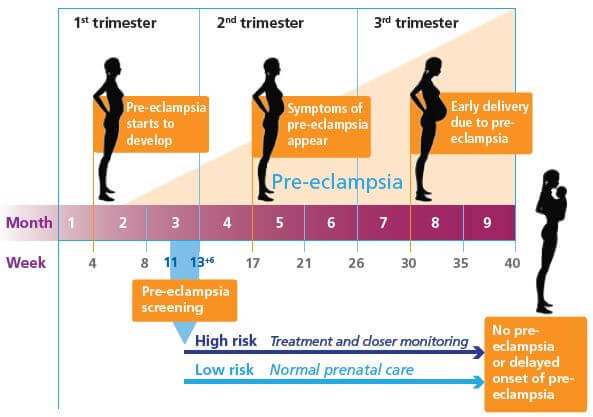What you should know about Pre-eclampsia?
Pre-eclampsia is a disorder that occurs in some pregnant women and causes high blood pressure and large amounts of protein in the urine where both fetus and mother can be severely affected. It causes the blood vessels to constrict and therefore, reduces the amount of oxygen and nutrients delivered to the fetus and can lead to low birth weight.
Pre-eclampsia appears after 20 weeks of pregnancy, and is more likely to show up in first pregnancies, multiple births, and women over 35.
Symptoms of Pre-eclampsia
- Hypertension
- Nausea and vomiting
- Upper abdominal pain
- Sudden excessive weight gain
- Excessive swelling of feet, legs, hands and face
- Visual problems (blurred vision, double vision, sudden blindness or seeing spot)
Risk factors for Pre-eclampsia
- Diabetes
- First pregnancy
- Family history of pre-eclampsia
- Pre-existing high blood pressure
- Being overweight before pregnancy
The new biomarker for Pre-eclampsia screening
It is a protein produced by the placenta. The growth factor is active in angiogenesis and endothelial cell growth. Reduced maternal serum concentration of placenta growth factor (PlGF) has been shown in a high proportion of pregnancies destined to develop pre-eclampsia.
The reduction is significant already in the first trimester, making PlGF an ideal marker for early screening of pre-eclampsia.
Why screening for Pre-eclampsia in first trimester of pregnancy?
Because second trimester is too late ! First trimester prediction of pre-eclampsia allows obstetricians to treat pregnant women earlier. This provides potential for improved outcomes for both the mother and the fetus.
Identification at the end of the first trimester allows:
- Increased surveillance of high risk pregnancies
- Earlier diagnosis of the clinical signs of the disease
- Earlier identification of the associated intra uterine growth restriction (IUGR)
- Wider ranging intervention possibilities
Complications of Pre-eclampsia
The more severe the pre-eclampsia and the earlier it occurs in pregnancy, the greater the risks for the mother and her baby. Pre-eclampsia may require induced labor and delivery by Caesarian section. Some of the complications include:
- Lack of blood flow to the placenta
- If the placenta doesn’t get enough blood, the baby may receive less oxygen and fewer nutrients which can lead to slow growth, low birth weight, preterm birth and breathing difficulties for the baby.
- Placental abruption
- Pre-eclampsia increases the risk of placental abruption, in which the placenta separates from the inner wall of the uterus before delivery
- Cardiovascular disease
- Having pre-eclampsia may increase the risk of future cardiovascular disease

Is there any preventive measure?
With good prenatal care, the disorder can shows that with daily low dose aspirin before 16 weeks of gestation, the incidence of pre-eclampsia, severe pre-eclampsia and pre-term birth in women identified to be at risk for pre-eclampsia can be significantly reduced.
- Mild pre-eclampsia – It can be managed by monitoring the mother’s blood pressure on a regular basis. If she is close to her due date, it is recommended to deliver earlier if she develops pre-eclampsia.
- Severe pre-eclampsia – If the mother is diagnosed with the condition, she must be monitored by her doctor, limit her activities and administer treatments which can prolong the pregnancy in order to aid in fetal development.
Common FAQs
- What kind and how much sample do you need?
About 5m1 of maternal blood in plain tube is required. - Why I need to do Pre-eclampsia Screening Test together with First Trimester Screening (FTS)?
Since both Pre-eclampsia Screening Test and FTS are using PAPP-A as one of the markers and using the same blood specimen, they can be done together to reduce the cost. - What can we do about Pre-eclampsia ?
Right now, early diagnosis through simple screening measures and good prenatal care can predict or delay many adverse maternal outcomes of pre-eclampsia. Prompt treatment saves lives.
Please consult your Obstetrician & Gynecologist for more information
Adapted from Early Screening of Pre-eclampsia – Copyright 2011 DNA Laboratories Sdn. Bhd. All Rights Reserved. PE/E/B2000



Add a Comment